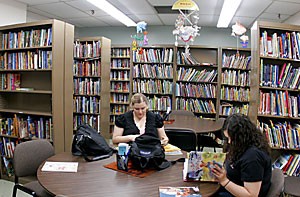Professor Kathy Short understands the global power of words. This fall, she is premiering the Worlds of Words project, which aims to expand students’ and teachers’ understanding of different parts of the world through children’s literature.
“”Particularly for U.S. kids, I’m really concerned that the majority of images about the world that they encounter are on television – which means it’s war, catastrophe and terrorism,”” Short said. “”Given the global world in which we live, kids need to understand how to interact with people from all different cultures, because that is their future.””
Part of the WOW project is the International Collection of Children’s and Adolescent Literature. Hiding in the basement of the Education building, the vast collection of children’s literature includes several rooms of books with a lounge and study areas.
Visitors can walk through and browse books by country and subject matter, Short said. The collection has many translated books, but also a large number in Spanish and other languages.
For years, Short collected children’s books U.S. publishers sent to her as review copies and books she accumulated from travels abroad.
She said she wanted a way to share her collection with everyone. Three years ago, she and College of Education dean Ron Marx revamped the basement and made room for the International Collection. Boxes of books are received every month, and the collection has grown to be the largest in the United States and the second largest in the world, Short said.
“”One of our main goals here is to build an international collection that’s the best in the United States,”” she said.
The WOW program aims to help teachers learn to use international literature as a way to build cultural understanding in their classrooms.
One of its initiatives is a Web site, www.wowlit.org that launches Monday, Short said. It will have a searchable database for teachers, an electronic journal and a “”WOW Review,”” where cultural insiders can evaluate the authenticity and cultural value of a book and share their thoughts with the teaching community.
Short said the WOW project was created to serve many local and international purposes.
“”For both our undergraduate and our graduate courses, this facility has been a way for people to actually get to interact with the books,”” she said. “”We’re also setting up workshops for the local community.””
To raise awareness of and funds for the WOW program, the College of Education will host a “”World’s Best Bedtime Stories”” fundraiser tomorrow from 5-7 p.m. in the Education
building lobby.
The reception will feature traveling book
collections comprised of the three best children’s books nominated from each participating country, Short said. The books will be on display according to different parts of the world and will be accompanied by artifacts from those countries.
International students dressed in native clothing will translate the books and talk about their cultures, she said.
A $50 entrance fee will fund the purchase of more books, Short said, adding that WOW will be hosting another event Dec. 8 for the larger community free of charge.
“”I’m really excited,”” she said. “”I think it’s going to look just magical.””
Yu-Ying Hou, a Taiwanese language, reading and culture doctoral student, works as a bookkeeper in the International Collection and will be one of the international students presenting at the reception.
“”I will be there to answer questions and translate,”” she said. “”Not a lot of people hear of my country. This is a way to help people to get to know my country.””
Education students who get exposed to international books will be able to pass on that knowledge to young students as elementary school teachers, said Seemi Raina, a language, reading and culture doctoral student who teaches a course on children’s literature.
“”It’s going to be a domino effect of learning, which is really going to impact the society,”” Raina said.
Raina moved to the United States from Islamabad, Pakistan, 10 years ago and will represent the Middle Eastern regions at tomorrow’s event. She said she hopes to introduce visitors to the importance today of children’s literature from the region.
“”We have this non-aggressive medium through which we can actually be exposed to the real world out there, of the children who are suffering,”” Raina said. “”There’s no way you can really change global policy, but this is one way of changing hearts and minds.””









